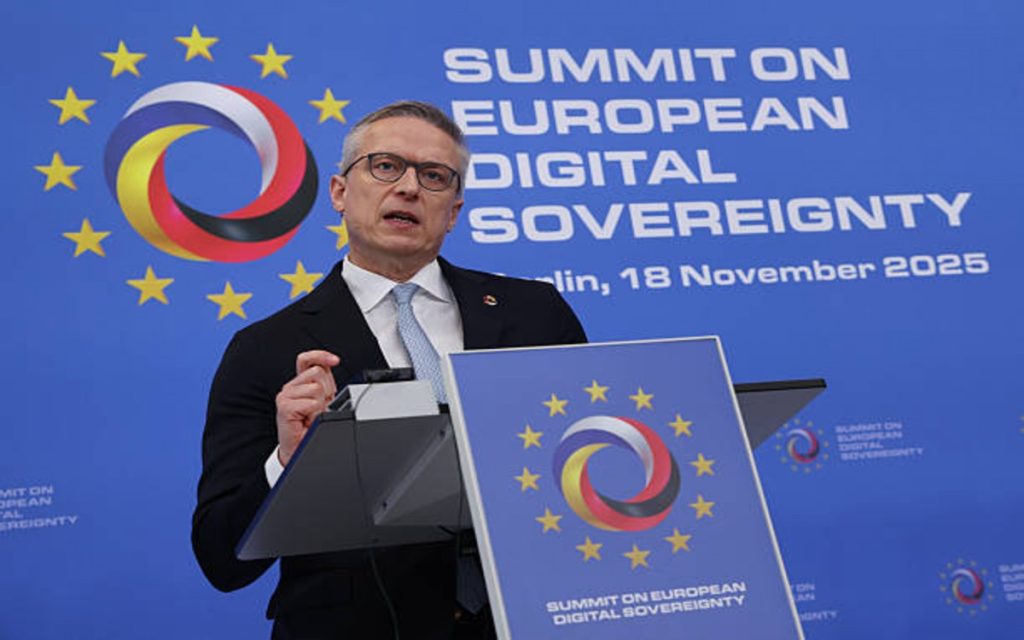
German Digital Infrastructure Minister Karsten Wildberger speaks to the media during the European Digital Sovereignty Summit in Berlin on Nov. 18, 2025. Sean Gallup/Getty Images
On 18 November 2025, Germany and France convened a high-level Berlin Sovereignty Summit at the EUREF Campus in Berlin to press Europe’s case for digital independence.
The summit assembled political leaders, industry executives, research directors and civil society representatives to align policy, investment and industrial planning for Europe’s digital future.
Organisers described the event as a joint Franco-German effort to translate the Franco-German Economic Agenda into concrete cross-border projects and financing mechanisms.
The summit agenda foregrounded artificial intelligence, cloud infrastructure, data governance, public-sector software and high-performance computing as immediate priorities.
Speakers and panels repeatedly framed the summit’s purpose as building trusted European alternatives to non-European hyperscalers and proprietary AI stacks.
Berlin Sovereignty Summit highlights Franco-German economic agenda and IPCEI priorities
Delegates tied the summit to the Franco-German Economic Agenda’s commitments on AI, quantum research, cloud services and coordinated procurement policies.
Officials presented the Important Project of Common European Interest (IPCEI) approach as the mechanism for pooling public funding and catalysing private investment in strategic technologies.
French and German ministers emphasised that IPCEI projects would prioritise interoperability, open standards and industrial uptake across member states.
Senior policy advisers outlined intentions to adapt procurement rules to favour verified, auditable, and open solutions for public administrations.
Berlin Sovereignty Summit pursues sovereign infrastructure in cloud, identity and open software
Germany and France reiterated a joint commitment to scale sovereign cloud services that keep sensitive data under European jurisdiction and legal protection.
Delegates set out plans to accelerate deployment of public-sector open-source suites, including coordinated rollouts of Germany’s openDesk and France’s La Suite Numérique.
Policy leads described a proposed European Digital Commons of interoperable public software components as a way to lower vendor lock-in and total cost of ownership for administrations.
Speakers underscored the role of a common European digital identity and wallet infrastructure as essential to secure cross-border public and private services.
Berlin Sovereignty Summit convenes public and private capital to bridge the investment gap
The Élysée brief and German statements at the summit framed the event as a signal to institutional investors that digital sovereignty requires coordinated deployment of public and private capital.
Finance panels explored blended finance models that combine EU structural funds, national budgets and venture capital for long-horizon infrastructure projects.
Industry representatives warned that commercial risk profiles for sovereign infrastructure differ from consumer cloud services and require tailored incentives.
Investment roundtables sought commitments for anchor tenancy and procurement guarantees to de-risk capital for European cloud and AI providers.
Berlin Sovereignty Summit launches a knowledge network for sustained policy design
On the summit’s periphery, organisers announced the European Network for Technological Resilience and Sovereignty to channel research, evaluation and policy support into European decision-making.
Founding partners named include major think tanks and academic centres tasked with producing independent assessments of supply chains, cyber resilience and industrial capacity.
Plenary speakers said the network would provide evidence to shape follow-on IPCEIs, procurement frameworks and standards for open and auditable AI models.
Policy experts noted that a persistent knowledge engine is necessary to convert summit declarations into durable governance and funding instruments.
Berlin Sovereignty Summit features operational projects including an Industrial AI Cloud
Government and industry briefings at the summit discussed the Industrial AI Cloud Project as a tangible example of sovereign infrastructure designed for manufacturing and critical supply chains.
The Industrial AI Cloud Project was described by participants as a collaborative effort between major European vendors, telcos and research labs to deliver trusted, enterprise-grade AI services under European legal control.
Project leads argued that industrial workloads require end-to-end control of data, model provenance and certification to meet procurement and safety requirements.
Observers said the project signals a shift from rhetorical sovereignty to operational initiatives that can be measured and governed.
Berlin Sovereignty Summit balances regulatory coordination and operational realities
Speakers emphasised that the summit would not replace EU policymaking but aimed to align member state positions on the Digital Markets Act, data governance and procurement rules.
German Chancellor Friedrich Merz warned at the summit that Europe remained “far too dependent on software from the United States,” a remark cited by several panellists as a strategic driver.
Germany’s digital minister repeated a line from recent briefings that “digital sovereignty does not mean protectionism” and that Europe must remain open to global markets while protecting critical infrastructures.
EU policy specialists on panels argued that regulatory coherence is essential to attract scalable private investment and to ensure cross-border interoperability.
Berlin Sovereignty Summit engages civil society on democratic values and digital rights
Civil society sessions convened NGOs, academics and parliamentary groups to stress the need for transparency, auditability and rights protections in sovereign tech initiatives.
Panelists cautioned that technology procurement for sovereignty must embed privacy-first design and independent oversight to preserve democratic norms.
Human rights advocates at the summit called for independent audit mechanisms for public-sector AI and for mandatory logging and explainability in critical public systems.
Participants concluded that societal trust is a precondition for scaled public adoption of sovereign digital tools.
Berlin Sovereignty Summit exposes political and market challenges
Speakers acknowledged several obstacles including fragmented funding, differing national procurement rules and the challenge of delivering near-term commercial returns on long-term infrastructure investments.
Ministers admitted that aligning EU member states behind common procurement standards will require negotiation over industrial policy, subsidies and state aid rules.
Industry leaders warned that if Europe over-insulates its market, it risks slowing innovation and provoking trade disputes with non-European partners.
Policy commentators also noted electoral cycles risk undermining multi-year commitments unless concrete governance and escrow mechanisms are agreed.
Berlin Sovereignty Summit outlines measurable next steps and deliverables
Officials set out a practical roadmap of near-term deliverables including pilot procurements, a schedule for coordinated IPCEI proposals and a timetable for interoperable public-sector software rollouts.
Governments pledged to publish joint procurement templates and certification standards for sovereign cloud providers within months to accelerate buyer confidence.
Ministers invited industry to present measurable commercial roadmaps for the Industrial AI Cloud and for high-performance computing capacity expansion.
Researchers were asked to provide baseline metrics for supply-chain resilience, model auditability and data portability ahead of next quarter review meetings.
Berlin Sovereignty Summit signals a new era but tests remain
The summit delivered a concentrated political signal that Franco-German leadership intends to convert high-level ambition into structured projects and financing instruments.
Strategic success will depend on aligning procurement, investment and standards without stifling competitive markets or violating EU single-market principles.
Analysts emphasised that the summit’s long-term impact will be judged by the first wave of implementable projects and whether they attract sustained private and institutional capital.
If the Berlin Sovereignty Summit translates commitments into operational infrastructure, Europe could gain greater control over critical digital systems and regulatory leverage in global markets.





